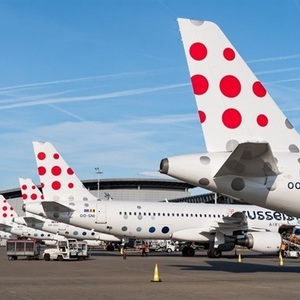Neste delivers SAF to Brussels Airport via CEPS pipeline

January 3, 2023
BY Neste Corp.
Brussels Airlines, the flag carrier of Belgium and part of the Lufthansa Group, has started the new year by being the first airline receiving a delivery of Neste MY Sustainable Aviation Fuel at Brussels Airport for the first time using the NATO Central European Pipeline System. Aviation fuel is supplied by CEPS to commercial airports in Europe, and from 1 January 2023 these airports can also receive sustainable aviation fuel (SAF) via the pipeline system.
Brussels Airlines has ambitious sustainability goals including an aim to emit 50 percent less CO2 by 2030 compared to 2019, become carbon neutral by 2050, and operate its first flight using SAF by 2023. The delivery of Neste’s SAF via the CEPS pipeline contributes to Brussels Airlines’ sustainability goals by enabling the airline to operate its first flight using SAF already at the start of 2023.
Advertisement
Advertisement
"To achieve our climate goals, we will have to drastically increase the use of alternatives to fossil fuels in the coming years. Together with the Lufthansa Group, we have already invested in the production and use of SAF for several years. The fact that sustainable aviation fuel can now be transported from the blending facility all the way to our aircraft in a fast and environmentally friendly way is an important step to increase the use of this type of fuel in the near future," said Peter Gerber, CEO of Brussels Airlines.
“Sustainable aviation fuel is the most effective tool currently available to reduce the emissions of air travel. Neste is working with partners like Brussel Airlines and the Lufthansa Group, airports and logistics providers to make SAF available across Europe and globally. Following permission by NATO to transport SAF on the CEPS system, we are proud to be the first to deliver SAF into the pipeline to Brussels airport. We look forward to using the largest pipeline system in Europe to supply other airports in the near future. Pipelines are the most efficient way to supply as Neste is scaling up SAF production capacity to 1.5 million tons annually in 2023,” said Jonathan Wood, vice president Europe, renewable aviation at Neste.
The first batch of Neste’s SAF for Brussels Airlines was loaded into the pipeline system as a ready-to-use blend with conventional jet fuel at Neste’s blending facilities in Ghent, Belgium at the turn of the year. From there, the fuel was transported by Brussels Airlines via the pipeline to the general fuel storage at Brussels Airport, making SAF available for use by Brussels Airlines.
Advertisement
Advertisement
Related Stories
Iowa farmers have a new market opportunity for their 2025 soybean crop. Landus is expanding its Clean Fuel Regulation initiative, made possible by recent policy changes expected to increase Canada's demand for liquid biofuel.
Topsoe, a leading global provider of advanced technology and solutions for the energy transition, has been selected as the renewable diesel technology partner for CountryMark’s Mount Vernon, Indiana refinery.
The U.S. exported 35,953.6 metric tons biodiesel and biodiesel blends of B30 or greater, according to data released by the USDA Foreign Agricultural Service on Aug. 5. Biodiesel imports were at 2,148.9 metric tons for the month.
XCF Global leverages Alfa Laval technology to enhance pretreatment capabilities at New Rise Reno facility
XCF Global Inc. on Aug. 5announced it leverages Alfa Laval Inc. pretreatment technology at its New Rise Reno biorefinery, a sustainable aviation fuel (SAF) plant located in Nevada. The pretreatment technology enhances feedstock flexibility at the plant.
U.S. Secretary of Agriculture Brooke L. Rollins on Aug. 1 announced the opening of a 30-day public comment period for stakeholders to provide feedback on the department’s reorganization plan, as outlined in the memorandum released July 24.
Upcoming Events










